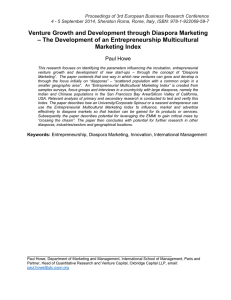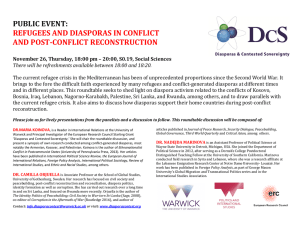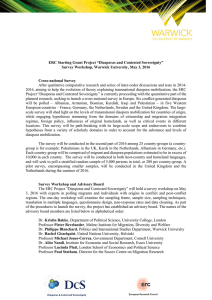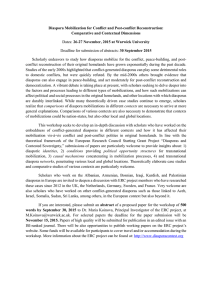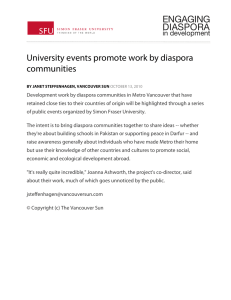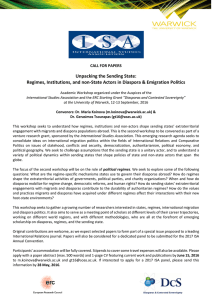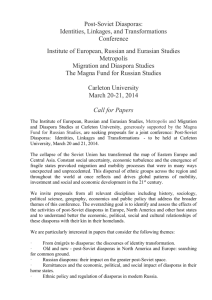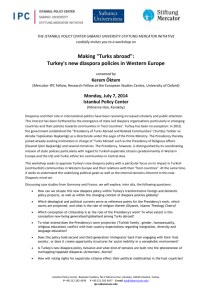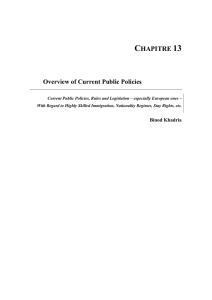Working Agenda and Programme
advertisement
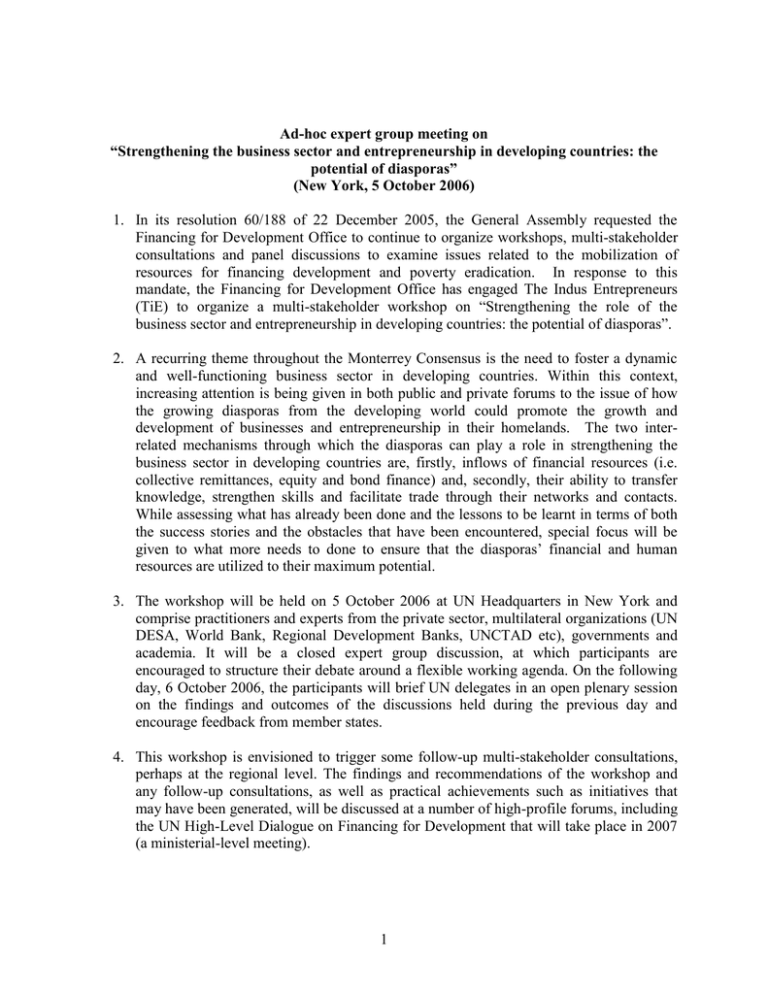
Ad-hoc expert group meeting on “Strengthening the business sector and entrepreneurship in developing countries: the potential of diasporas” (New York, 5 October 2006) 1. In its resolution 60/188 of 22 December 2005, the General Assembly requested the Financing for Development Office to continue to organize workshops, multi-stakeholder consultations and panel discussions to examine issues related to the mobilization of resources for financing development and poverty eradication. In response to this mandate, the Financing for Development Office has engaged The Indus Entrepreneurs (TiE) to organize a multi-stakeholder workshop on “Strengthening the role of the business sector and entrepreneurship in developing countries: the potential of diasporas”. 2. A recurring theme throughout the Monterrey Consensus is the need to foster a dynamic and well-functioning business sector in developing countries. Within this context, increasing attention is being given in both public and private forums to the issue of how the growing diasporas from the developing world could promote the growth and development of businesses and entrepreneurship in their homelands. The two interrelated mechanisms through which the diasporas can play a role in strengthening the business sector in developing countries are, firstly, inflows of financial resources (i.e. collective remittances, equity and bond finance) and, secondly, their ability to transfer knowledge, strengthen skills and facilitate trade through their networks and contacts. While assessing what has already been done and the lessons to be learnt in terms of both the success stories and the obstacles that have been encountered, special focus will be given to what more needs to done to ensure that the diasporas’ financial and human resources are utilized to their maximum potential. 3. The workshop will be held on 5 October 2006 at UN Headquarters in New York and comprise practitioners and experts from the private sector, multilateral organizations (UN DESA, World Bank, Regional Development Banks, UNCTAD etc), governments and academia. It will be a closed expert group discussion, at which participants are encouraged to structure their debate around a flexible working agenda. On the following day, 6 October 2006, the participants will brief UN delegates in an open plenary session on the findings and outcomes of the discussions held during the previous day and encourage feedback from member states. 4. This workshop is envisioned to trigger some follow-up multi-stakeholder consultations, perhaps at the regional level. The findings and recommendations of the workshop and any follow-up consultations, as well as practical achievements such as initiatives that may have been generated, will be discussed at a number of high-profile forums, including the UN High-Level Dialogue on Financing for Development that will take place in 2007 (a ministerial-level meeting). 1 Attachment 1 Working agenda for ad-hoc expert group meeting on “Strengthening the business sector and entrepreneurship in developing countries: the potential of diasporas” Session I: Setting the Stage o The differences between diaspora entrepreneurs and other international investors o The differences within and between different diasporas and the implications for their contribution to business development in the homeland o The driving forces behind the activities of diasporas (including the impact of globalization) o The emergence and nature of diaspora networks o The inter-related financial and non-financial aspects of diaspora contributions and the mechanisms through which these have been generated o Success stories, obstacles, and the problems with measurement and evaluation Session II: Strengthening linkages and facilitating trade, skills and knowledge transfer o The impact of entrepreneurship by the different diasporas on the economy of their countries of origin, including: Nature of interaction with local firms and levels of local business formation and development Impact on the local and wider economy Impact across different sectors and segments of society Impact on rural development and poverty alleviation Potential for enhancing impact in the above areas o The mechanisms and success of diasporas in different countries and sectors in: Facilitating access of local companies to overseas markets Transferring skills and knowledge to enhance entrepreneurship and business development Promoting innovation and product development o Proposed initiatives, lessons learnt and policy recommendations, including possibilities for public/private cooperation Session III: Augmenting and channeling finance o Assessing the financing initiatives to encourage business formation and development that have been, or could be, undertaken by the different diasporas, including: 2 Collective remittances and investment vehicles Equity finance Bond finance Financing start-ups o Examining the possibilities for public policies and public/private cooperation, including in the following areas: Leveraging diaspora funds Risk mitigation Securitization of remittance receipts Increasing the volume and value of collective remittances Promoting money transfer organizations and credit unions Regulatory and exchange rate policies o Proposed initiatives, lessons and policy recommendations Session IV: Enabling policies and institutions o Examining the rationale for special policies for the diaspora o Identifying the policies that have a) successfully promoted the contribution of diasporas to business development in their homelands and b) failed to generate the desired outcomes (taking into account the lessons drawn from sessions I, II and III) o Considering the necessary institutional arrangements to facilitate and fully leverage the contribution of diasporas to business development including: Diaspora/migrant associations Transnational business associations linking migrants with home country National chambers of commerce Internet-based networking arrangements Investment promotion agencies Export-promotion agencies Alliances between diaspora associations and foundations/NGOs o Exploring ways of strengthening and institutionalizing different forms of diaspora networks. Considering the use of aid resources for capacity building to strengthen diaspora associations and networks o Outlining the possibilities for diaspora associations to work with governments and aid agencies in formulating country programs for development assistance o Other possible policies at the international level (e.g. by host countries, multilateral institutions, donors) to encourage diaspora involvement in home countries. If pro- 3 diaspora policies are necessary, what can be done to encourage them to be put in place by governments? o Examining the potential for collaboration between different countries for policy formulation to leverage diaspora linkages 4 Attachment 2 Program for ad hoc expert meeting on “Strengthening the business sector and entrepreneurship in developing countries: the potential of diasporas” Date: 5 October 2006 Venue: United Nations, Conference Room 8 9.30 a.m. – 9.45 am. Welcome: Mr. Oscar de Rojas, Director, Financing for Development Office, United Nations Department of Economic and Social Affairs and Mr. Parag Saxena, President, Tri-State Chapter of The Indus Entrepreneurs 9.45 a.m. – 10 am. Opening Remarks: Mr. Jomo Kwame Sundaram, Assistant SecretaryGeneral for Economic Development, United Nations 10 a.m. – 11.30 am. Session I: Overview and setting the stage Moderator: Mr. Rajat Gupta, Senior Partner Worldwide, McKinsey and Co Speakers: i) Mr. Devesh Kapur, Professor and Director, Center for Advanced Study of India, University of Pennsylvania ii) Mr. Yevgeny Kuznetsov, Senior Economist, World Bank iii) Mr. Chukwu-Emeka Chikezie, Executive Director, African Foundation for Development, AFFORD 11.30 a.m. – 1p.m. Session II: Strengthening linkages and facilitating trade, skills and knowledge transfer Moderator: Mr. Barry Herman, Senior Fellow, New School of Social Research Speakers: i) Ms. Jennifer Brinkerhoff, Associate Professor of Public Information and International Affairs, George Washington University; ii) Ms. Wanja Michuki, Chief Executive Officer, Highland Tea Company; iii) Ms. T.A. Banjoko, Head, Africa Recruit iv) Ms. Molly Pollack, Executive Director, Chile Global v) Mr. Richard Tan, Chief Executive Officer, Pacific Millennium Corporation 1.00 p.m. – 2.30 p.m. Luncheon. Luncheon speaker: Mr. Parag Saxena 2.30 p.m. – 4.00 p.m. Session III: Channeling finance Moderator: Mr. Arun Kashyap, Private Sector Development Adviser, United Nations Development Programme 5 Speakers: i) Mr. Kai Schmitz, Executive Vice President and Chief Operations Officer, Microfinance International Corporation ii) Mr. Suni Munshani, Chief Executive Officer, Novitaz iii) Ms. Marsha Wulff, Founder and Principal, Wulff Capital iv) Ms. Lenora Suki, Associate Director, Center on Globalization and Sustainable Development, The Earth Institute at Columbia University 4.00 p.m. – 5.30 p.m. Session IV: Enabling policies and institutions Moderator: Mr. Manuel Montes, Chief, Policy Analysis and Development Branch, Financing for Development Office, Department of Economic and Social Affairs, United Nations Speakers: i) Ms. Nienke Stam, IntEnt ii) Ms. Natasha Iskander, Assistant Professor of Public Policy, Wagner School of Public Policy, New York University iii) Ms. Lisa Curtis, Private Sector Adviser, UK Department for International Development (DFID) iv) Ms. Liesl Riddle, Assistant Professor of International Business and International Affairs, George Washington University 5.30 p.m – 6.00 p.m. Conclusions and Next Steps 6
